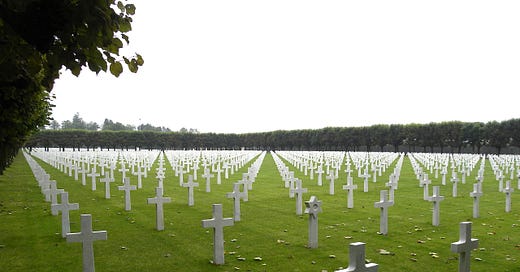The “Letters From an American” post of 11/10 is an interesting use of History to make points about the present. Heather briefly mentions the armistice signed on the 11th hour of the eleventh day of the eleventh month and then launches into a story about Woodrow Wilson's desire to create a League of Nations and "Republican Henry Cabot Lodge of Massachusetts -- who had been determined to weaken Wilson as soon as the imperatives of war had fallen away." The implication is that Lodge vindictively blocked "Wilson's brainchild", to the detriment of the US and the world.
This is not the only way of looking at this disagreement. In a guest post on the Library of Congress website, Richard Striner (a Washington College professor and biographer of Wilson) wrote, "Wilson himself was in large part to blame for the fact that the United States did not join the League of Nations. He made one mistake after another as he handled the issues from 1918 to 1920," Striner continues, implying that a main cause of the problem was that Wilson was "too frequently petulant, stubborn, and irrational." (see https://www.loc.gov/static/programs/national-recording-preservation-board/documents/WilsonsArmisticeDayBroadcast.pdf) Heather also calls attention to a 1923 radio address (the first recording of a radio broadcast, as far as we can tell) in which Wilson complains about the "shameful fact" that the US had turned away from running a new world order, which he claimed was "deeply ignoble because manifestly cowardly and dishonorable." You can listen to that recording here: https://www.c-span.org/video/?418067-1/woodrow-wilson-1923-radio-address. An important thing to remember when you do is that Wilson was near death, which is why he sounds so weak and speaks so slowly. He had suffered a stroke in early October 1919 while campaigning for the League of Nations. This was Wilson's third stroke, and although he was severely debilitated he hid his condition from the American people and even held out hope for a third term in office (check here for details).
Heather goes on to say that "neither the 'war to end all wars' nor the commemorations of it, ended war." The Second World War, she continues, gave more power to the idea of what she calls a "rules-based international order." She says:
The new international system provided forums for countries to discuss their differences—like the United Nations, founded in 1945—and mechanisms for them to protect each other, like the North Atlantic Treaty Organization (NATO), established in 1949, which has a mutual defense pact that says any attack on a NATO country will be considered an attack on all of them.
While this may be merely a patriotic reminder, I'm also reminded that Heather used the words "rule-based international order" a couple of days ago too. So, since we're on the subject of World War I, let's also remember the domino effect that began that war, when a series of mutual-defense treaties were triggered that dragged all of Europe into a war that then became global. Because Heather is right: Article 5 of the NATO Treaty obligates member states to go to war when any member is attacked. Just as Senate Foreign Relations Committee Chair Lodge did in 1919, I think we'd be wise to ask ourselves some serious questions about our national interests.





So Wilson, Roosevelt and Bartlett all lied over health concerns to the votes ALL democrats, apparently. ; )))))